Key takeaways:
- Python’s simplicity and readability make it approachable for beginners while being powerful for advanced users.
- Setting clear and specific goals significantly accelerated learning and maintained motivation through challenges.
- Hands-on projects and practical exercises solidified coding skills and illustrated the versatility of Python.
- Engagement with the Python community through forums and collaborative projects enhanced the learning experience and provided vital support.
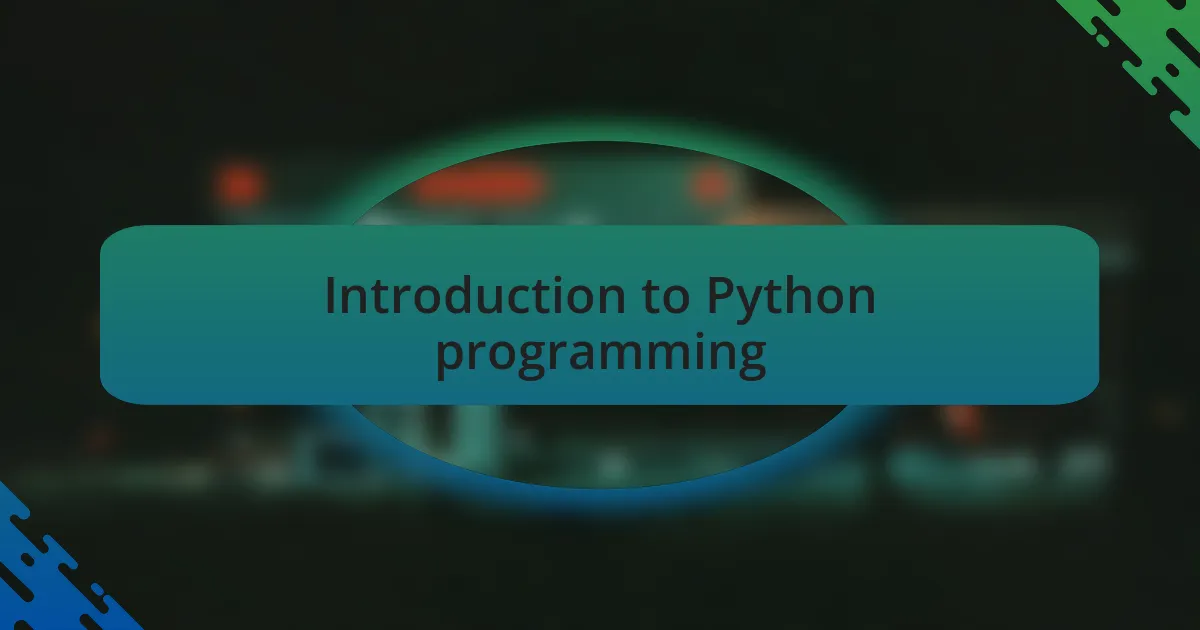
Introduction to Python programming
Python is a versatile programming language that I’ve found to be incredibly approachable for beginners, yet powerful enough for seasoned developers. When I first opened my Python development environment, I felt a mix of excitement and trepidation—would I be able to grasp its concepts quickly? The simplicity of its syntax, like using plain English, made those initial steps feel less daunting.
As I delved into Python, I discovered its vast ecosystem of libraries and frameworks, which turned out to be a treasure trove for anyone looking to build applications. I remember the thrill of creating my first simple script; it was like unlocking a new skill. Have you ever tried to build something from scratch and been surprised by how quickly you could see results?
From web development to data analysis, Python’s flexibility is remarkable. Reflecting on my journey, I realize that the community support was invaluable, offering resources and encouragement. It made me think: in a world filled with complex languages, why does Python feel like such a welcoming space? For anyone considering this path, the answer is clear—Python is about making coding accessible and enjoyable.
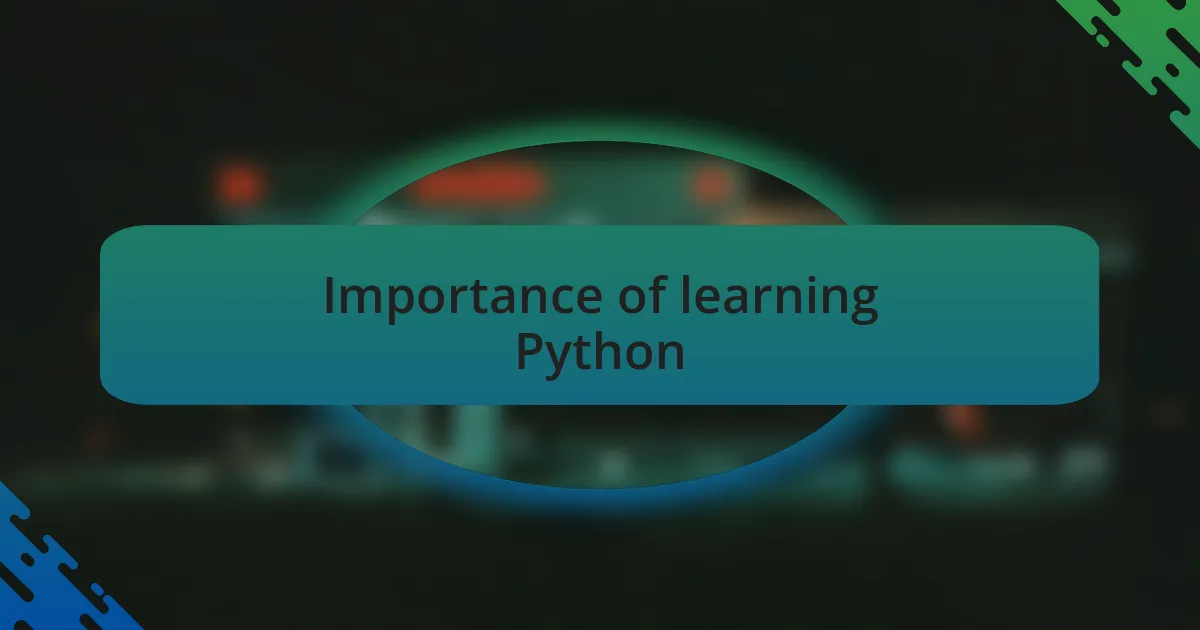
Importance of learning Python
Learning Python is crucial in today’s tech-driven world, as it’s frequently the go-to language for many fields, from web development to scientific computing. I remember feeling both inspired and challenged when I realized that mastering Python opened doors to diverse opportunities in my career. How could a single language wield so much power?
Moreover, Python’s readability and simplicity not only speed up development time but also enhance collaboration among teams. There were moments when I struggled with a project, but I found that the straightforward nature of Python’s syntax allowed my teammates and me to resolve issues efficiently. This clarity in communication transformed stressful coding sessions into productive brainstorming opportunities.
The thriving community around Python contributed significantly to its importance, providing endless resources and support. I recall diving into forums late at night, searching for solutions and finding not just answers but also camaraderie among fellow learners. Isn’t it reassuring to know you’re part of such an encouraging network? This interconnectedness fosters growth, making the journey of learning Python not just educational but also genuinely enjoyable.
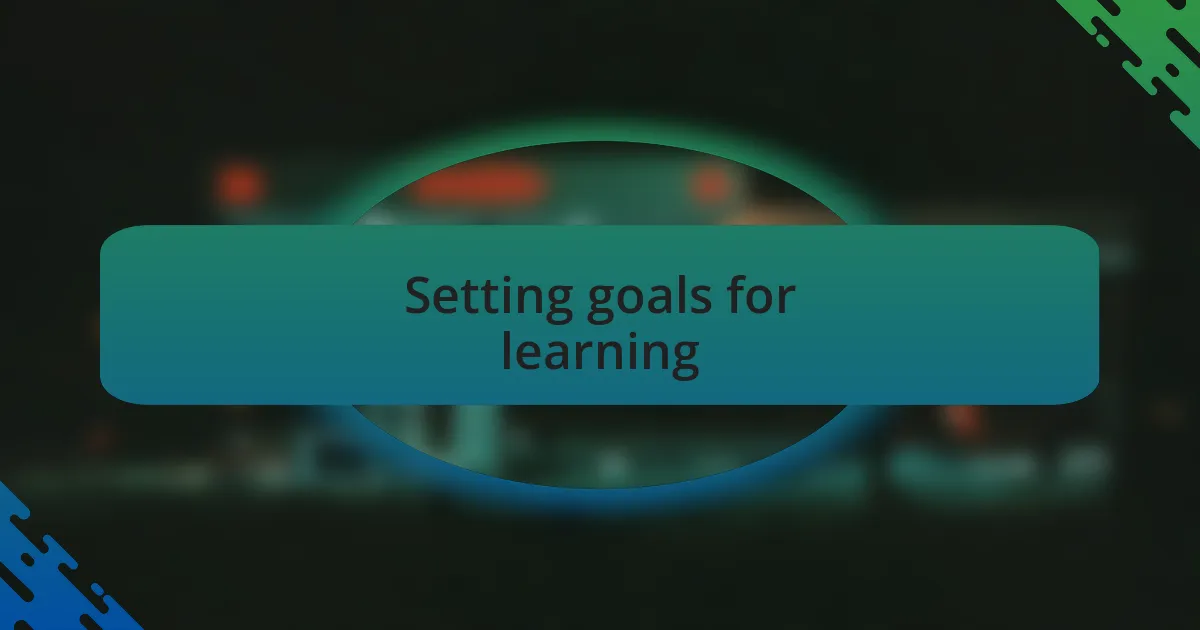
Setting goals for learning
Setting clear goals was a game-changer in my journey to learn Python. Initially, I thought simply dedicating an hour a day would suffice, but I quickly realized that specificity mattered. When I started focusing on specific skills, like building a web scraper or automating a tedious task, my progress accelerated—I could measure success not just in hours spent but in completed projects.
I vividly remember the moment I set a goal to create a small game using Python by the end of my month. This goal served as both a challenge and an anchor, keeping me motivated through the tougher learning curves. How rewarding it was to see my initial ideas transform into actual code on the screen! It fueled my passion and made the learning process feel like a creative endeavor rather than a chore.
Furthermore, I learned the importance of flexibility in my goals. Sometimes, life throws unexpected events your way, and I had to adjust my timeline. Being adaptable allowed me to stay committed without falling into frustration. Have you experienced the same? Remember, it’s perfectly fine to iterate on your goals as your skills grow, turning challenges into stepping stones rather than roadblocks.
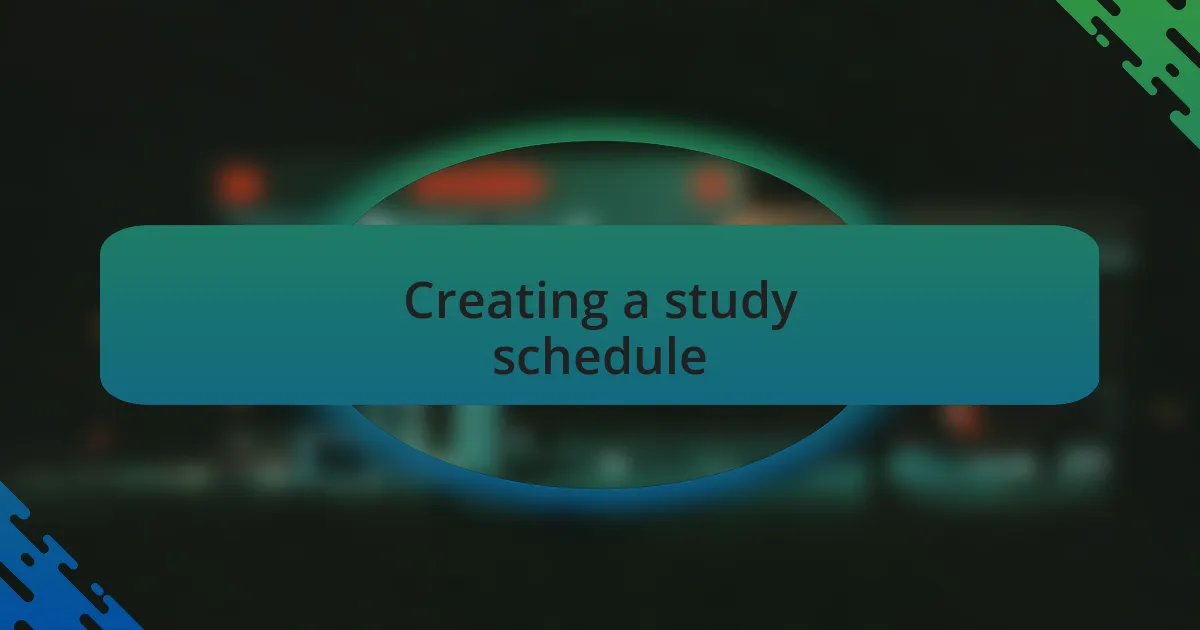
Creating a study schedule
Creating a study schedule was critical for my learning journey in Python. I approached it like crafting a recipe: you need the right ingredients in the right proportions. I started by mapping out my week, dedicating specific time blocks to different topics—such as syntax, data structures, and libraries. Initially, it felt overwhelming, but breaking it down made learning manageable and even enjoyable.
One memorable experience was when I set aside Saturday mornings exclusively for hands-on projects. There was something magical about those quiet hours—my focus was razor-sharp. During one of those sessions, I unexpectedly hit a breakthrough while working on a project that used web scraping. It was both surprising and thrilling to see how my efforts were paying off, reinforcing my resolve to stick to the schedule.
Sometimes, I found myself staring at the clock, wondering if I’d chosen the right pace. Did I overestimate my abilities? I learned that it was okay to adjust my study schedule. For instance, when I struggled with a particular library, I realized I needed to dedicate more time to it rather than racing toward my next topic. This flexibility not only alleviated stress but also allowed me to deepen my understanding. How has your experience with study schedules shaped your learning?
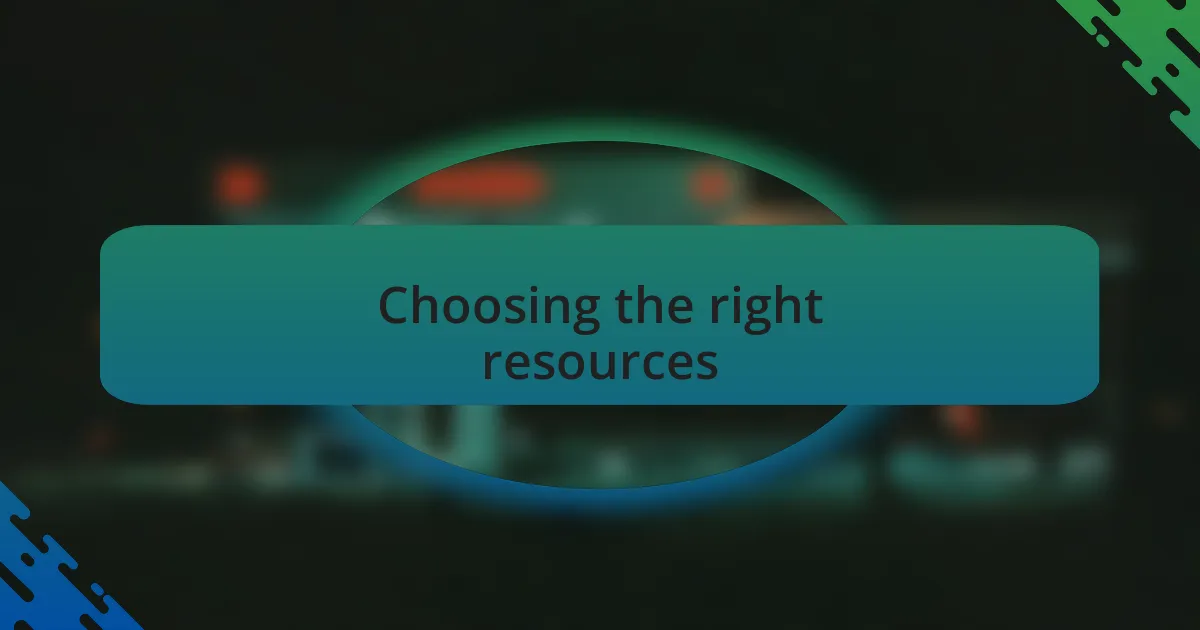
Choosing the right resources
Choosing the right resources was pivotal in my month-long Python journey. I remember the excitement—and sometimes the confusion—of navigating through countless online courses, tutorials, and books. After trying a few popular platforms, I quickly realized that interactive resources, like code challenges on websites such as Codecademy, kept me motivated. Have you ever felt more engaged when learning through hands-on practice?
One resource that stood out was a comprehensive Python book that broke down complex topics into digestible sections. I often found myself reading a chapter and immediately applying what I learned in a mini-project. This immediate application transformed abstract concepts into tangible skills, reinforcing my understanding. At one point, I stumbled upon a tutorial series that was narrated skillfully; the instructor’s passion ignited my enthusiasm to learn even more.
Additionally, I discovered the power of community through forums and social media groups dedicated to Python. Joining these communities offered me support and a sense of belonging; sharing my challenges and achievements felt incredibly fulfilling. I often wondered how I would navigate the complex landscape of programming without those connections. Through their encouragement and shared experiences, I realized that the right resources extend beyond text—they’re about fostering a collaborative learning environment.
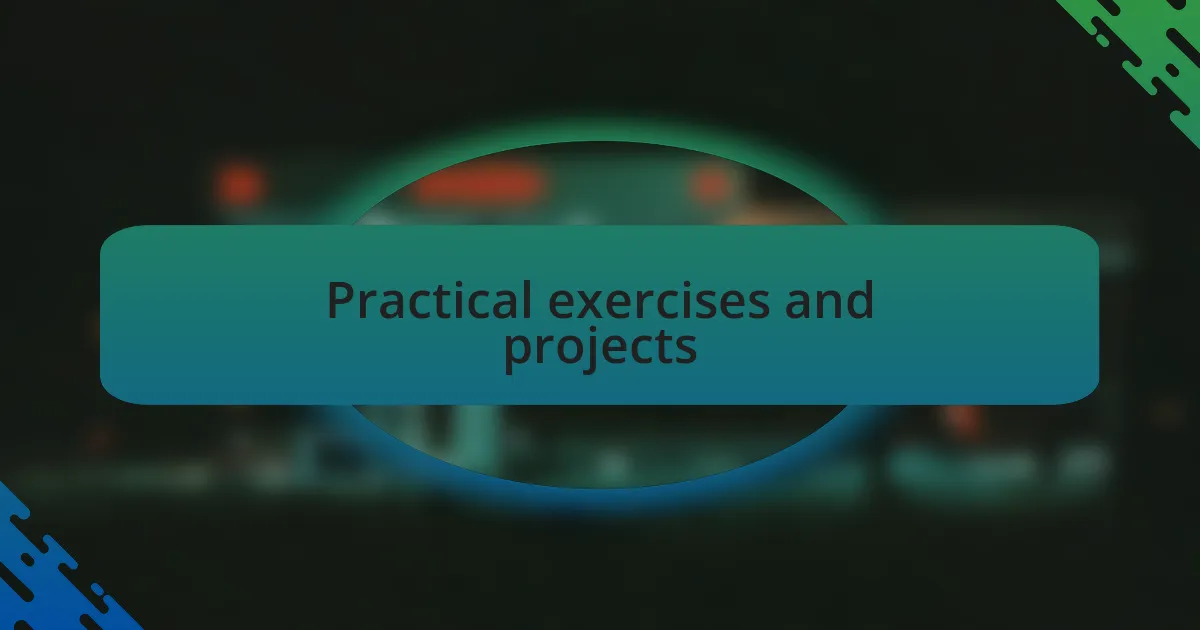
Practical exercises and projects
Taking on practical exercises and projects was a game-changer in my learning process. I vividly recall tackling my first mini-project—a simple to-do list application. It was challenging yet thrilling to see my code come to life, which made me appreciate the power of Python. Have you ever experienced that rush of accomplishment when your project runs without errors? I certainly did, and it pushed me to keep going.
As I progressed, I decided to integrate real-world problems into my projects. For instance, I built a small web scraper to collect data about local restaurants. The thrill of automating a task that would have taken hours manually was exhilarating. Through these projects, I not only solidified my coding skills but also discovered how versatile Python could be. It made me wonder: how many other everyday tasks could I simplify through programming?
Collaborating with others on practical exercises further enriched my learning experience. Working on a group project to create a simple game introduced me to code reviews and constructive feedback. It was both humbling and enlightening to see how different minds approach the same problem. Have you ever found that collaboration sparks new ideas? I now believe that sharing projects and experiences with others is an essential part of mastering any skill.
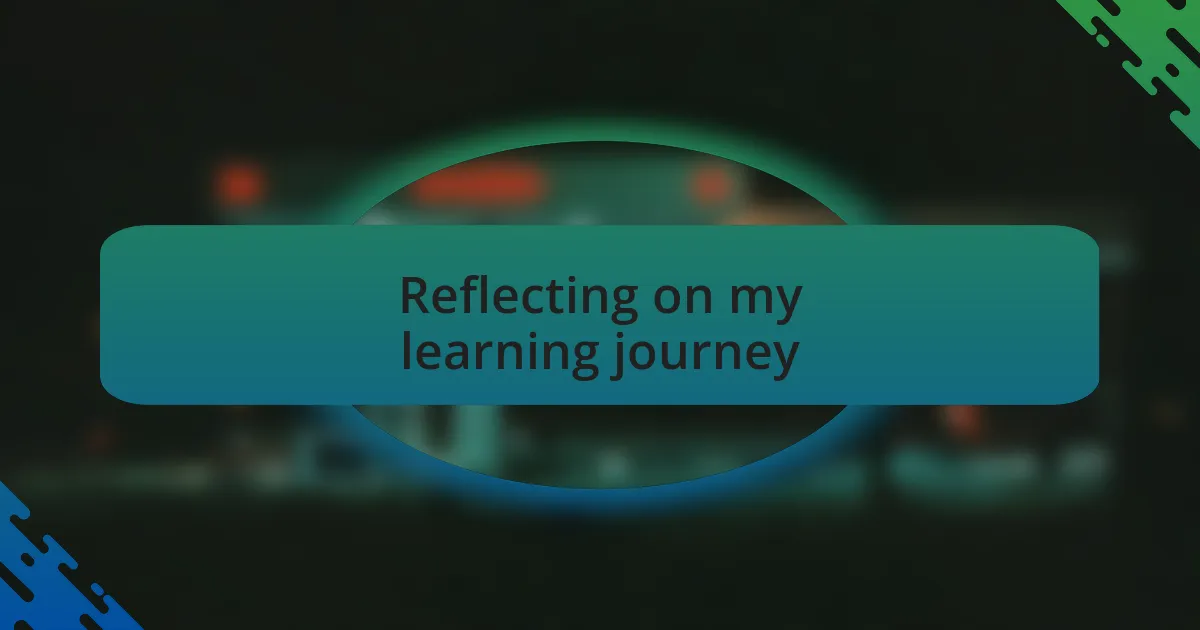
Reflecting on my learning journey
Reflecting on my learning journey, I realize how pivotal those initial moments of frustration were. I remember staring at a stubborn error message for hours, feeling like I was hitting a wall. Each time I finally figured it out, it brought a rush of relief and elation that now, looking back, formed the backbone of my perseverance. These challenges didn’t just test my skills; they taught me resilience.
As I delved deeper into Python, the connection between my learning and self-discovery became evident. I discovered that programming wasn’t just about writing code; it was about problem-solving and creativity. The satisfaction of crafting a solution from scratch felt transformational. Can you recall a moment when learning something new shifted your perspective? For me, each small victory in coding redefined what I believed I was capable of achieving.
Moreover, one particular late-night coding session stands out in my mind—an experience that felt almost like an epiphany. I was debugging a particularly tricky piece of code when the solution suddenly clicked. I couldn’t help but grin at my screen, marveling at how far I’d come in just a few weeks. Moments like those made me appreciated the intricate dance between frustration and triumph in the learning process. How often do we overlook these small victories? In retrospect, they were the milestones that fueled my passion for programming.